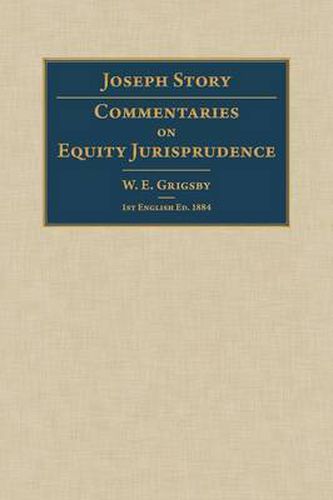Readings Newsletter
Become a Readings Member to make your shopping experience even easier.
Sign in or sign up for free!
You’re not far away from qualifying for FREE standard shipping within Australia
You’ve qualified for FREE standard shipping within Australia
The cart is loading…






This title is printed to order. This book may have been self-published. If so, we cannot guarantee the quality of the content. In the main most books will have gone through the editing process however some may not. We therefore suggest that you be aware of this before ordering this book. If in doubt check either the author or publisher’s details as we are unable to accept any returns unless they are faulty. Please contact us if you have any questions.
Reprint of the first English edition, based on the 12th American edition with notes on English decisions by W.E. Grigsby. Originally published: London: Stevens and Haynes, 1884. lxxiii, 1093 pp. Probably the decisive factor in our reception of English equity was Story’s Equity Jurisprudence. With much art (…) he made it seem that the precepts established by the decisions of the English Courts of Chancery coincided in substance with those of the Roman law as expounded by the civilians and hence were but statements of universal principles of natural law universally accepted in civilized states. If equity had been expounded to American judges and lawyers and students in the dry and technical fashion of the contemporary English treatises, we might have been sorely hampered in the development of American Law by a crippled equity. Story’s sympathetic exposition of English equity (…) was the one thing needed to commend equity to our American courts and to counteract the forces that were working against it. – Pound, The Formative Era in American Law 156-157
Apart from James Kent, no man has had greater influence on the development of American law than Joseph Story [1779-1845]. He was Dane Professor of Law at Harvard, where he played a key role in the growth of the school and the establishment of its national eminence, and an associate justice of the U.S. Supreme Court, where he was the author of several landmark decisions, such as Martin v. Hunter’s Lessee. His many books, most notably the monumental work Commentaries on the Constitution (1833), have been cited extensively, and he remains an authority today.
$9.00 standard shipping within Australia
FREE standard shipping within Australia for orders over $100.00
Express & International shipping calculated at checkout
This title is printed to order. This book may have been self-published. If so, we cannot guarantee the quality of the content. In the main most books will have gone through the editing process however some may not. We therefore suggest that you be aware of this before ordering this book. If in doubt check either the author or publisher’s details as we are unable to accept any returns unless they are faulty. Please contact us if you have any questions.
Reprint of the first English edition, based on the 12th American edition with notes on English decisions by W.E. Grigsby. Originally published: London: Stevens and Haynes, 1884. lxxiii, 1093 pp. Probably the decisive factor in our reception of English equity was Story’s Equity Jurisprudence. With much art (…) he made it seem that the precepts established by the decisions of the English Courts of Chancery coincided in substance with those of the Roman law as expounded by the civilians and hence were but statements of universal principles of natural law universally accepted in civilized states. If equity had been expounded to American judges and lawyers and students in the dry and technical fashion of the contemporary English treatises, we might have been sorely hampered in the development of American Law by a crippled equity. Story’s sympathetic exposition of English equity (…) was the one thing needed to commend equity to our American courts and to counteract the forces that were working against it. – Pound, The Formative Era in American Law 156-157
Apart from James Kent, no man has had greater influence on the development of American law than Joseph Story [1779-1845]. He was Dane Professor of Law at Harvard, where he played a key role in the growth of the school and the establishment of its national eminence, and an associate justice of the U.S. Supreme Court, where he was the author of several landmark decisions, such as Martin v. Hunter’s Lessee. His many books, most notably the monumental work Commentaries on the Constitution (1833), have been cited extensively, and he remains an authority today.